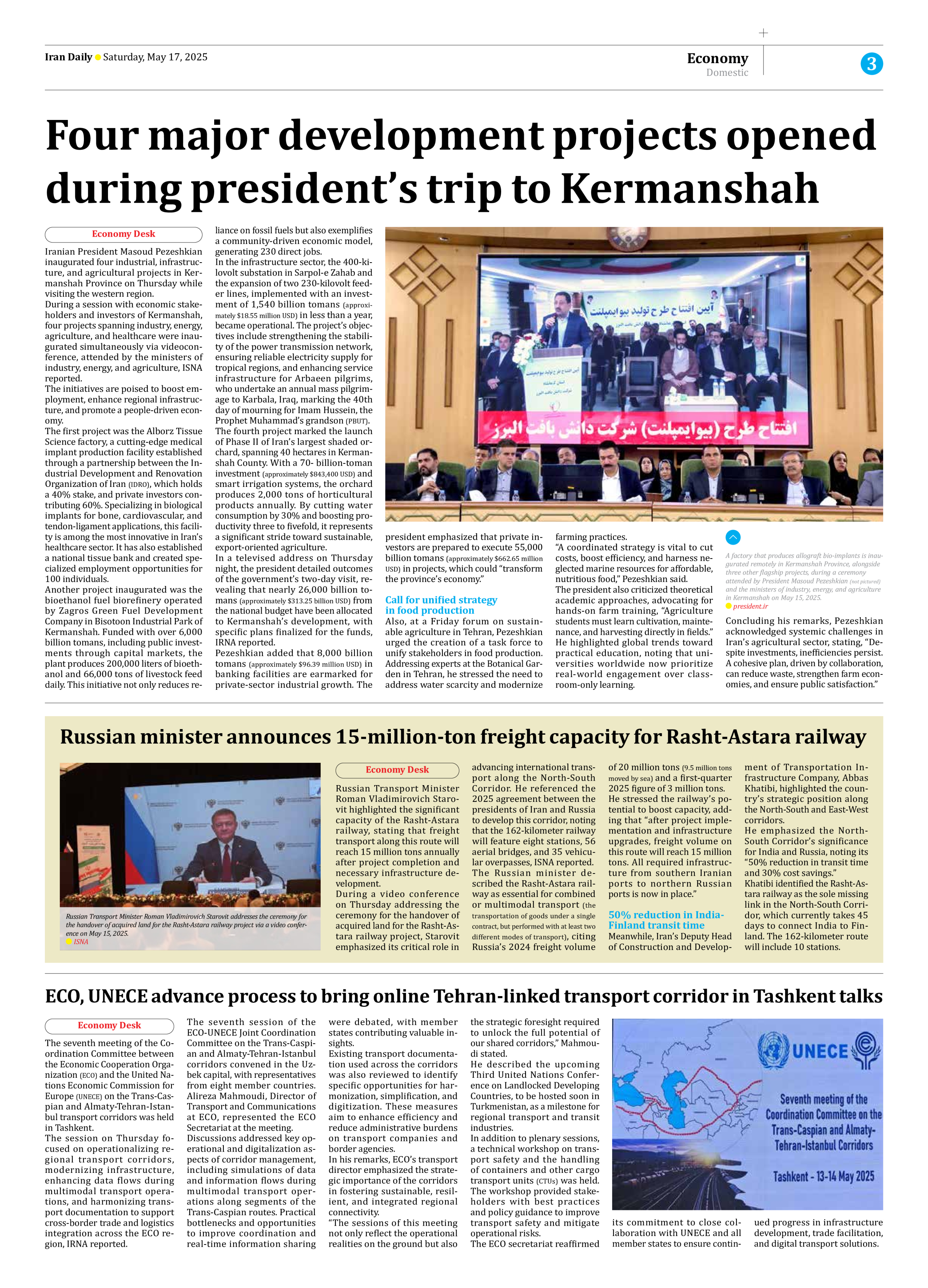
Four major development projects opened during president’s trip to Kermanshah
Iranian President Masoud Pezeshkian inaugurated four industrial, infrastructure, and agricultural projects in Kermanshah Province on Thursday while visiting the western region.
During a session with economic stakeholders and investors of Kermanshah, four projects spanning industry, energy, agriculture, and healthcare were inaugurated simultaneously via videoconference, attended by the ministers of industry, energy, and agriculture, ISNA reported.
The initiatives are poised to boost employment, enhance regional infrastructure, and promote a people-driven economy.
The first project was the Alborz Tissue Science factory, a cutting-edge medical implant production facility established through a partnership between the Industrial Development and Renovation Organization of Iran (IDRO), which holds a 40% stake, and private investors contributing 60%. Specializing in biological implants for bone, cardiovascular, and tendon-ligament applications, this facility is among the most innovative in Iran’s healthcare sector. It has also established a national tissue bank and created specialized employment opportunities for 100 individuals.
Another project inaugurated was the bioethanol fuel biorefinery operated by Zagros Green Fuel Development Company in Bisotoon Industrial Park of Kermanshah. Funded with over 6,000 billion tomans, including public investments through capital markets, the plant produces 200,000 liters of bioethanol and 66,000 tons of livestock feed daily. This initiative not only reduces reliance on fossil fuels but also exemplifies a community-driven economic model, generating 230 direct jobs.
In the infrastructure sector, the 400-kilovolt substation in Sarpol-e Zahab and the expansion of two 230-kilovolt feeder lines, implemented with an investment of 1,540 billion tomans (approximately $18.55 million USD) in less than a year, became operational. The project’s objectives include strengthening the stability of the power transmission network, ensuring reliable electricity supply for tropical regions, and enhancing service infrastructure for Arbaeen pilgrims, who undertake an annual mass pilgrimage to Karbala, Iraq, marking the 40th day of mourning for Imam Hussein, the Prophet Muhammad’s grandson (PBUT).
The fourth project marked the launch of Phase II of Iran’s largest shaded orchard, spanning 40 hectares in Kermanshah County. With a 70- billion-toman investment (approximately $843,400 USD) and smart irrigation systems, the orchard produces 2,000 tons of horticultural products annually. By cutting water consumption by 30% and boosting productivity three to fivefold, it represents a significant stride toward sustainable, export-oriented agriculture.
In a televised address on Thursday night, the president detailed outcomes of the government’s two-day visit, revealing that nearly 26,000 billion tomans (approximately $313.25 billion USD) from the national budget have been allocated to Kermanshah’s development, with specific plans finalized for the funds, IRNA reported.
Pezeshkian added that 8,000 billion tomans (approximately $96.39 million USD) in banking facilities are earmarked for private-sector industrial growth. The president emphasized that private investors are prepared to execute 55,000 billion tomans (approximately $662.65 million USD) in projects, which could “transform the province’s economy.”
Call for unified strategy
in food production
Also, at a Friday forum on sustainable agriculture in Tehran, Pezeshkian urged the creation of a task force to unify stakeholders in food production. Addressing experts at the Botanical Garden in Tehran, he stressed the need to address water scarcity and modernize farming practices.
“A coordinated strategy is vital to cut costs, boost efficiency, and harness neglected marine resources for affordable, nutritious food,” Pezeshkian said.
The president also criticized theoretical academic approaches, advocating for hands-on farm training, “Agriculture students must learn cultivation, maintenance, and harvesting directly in fields.”
He highlighted global trends toward practical education, noting that universities worldwide now prioritize real-world engagement over classroom-only learning.
Concluding his remarks, Pezeshkian acknowledged systemic challenges in Iran’s agricultural sector, stating, “Despite investments, inefficiencies persist. A cohesive plan, driven by collaboration, can reduce waste, strengthen farm economies, and ensure public satisfaction.”







